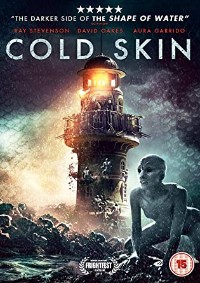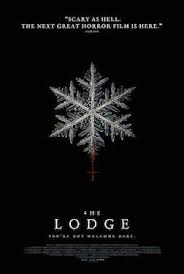
Cold Skin (Shudder)
Cold Skin (2017) is what I suspect a lot of us thought we were going to get going into The Lighthouse after seeing The Witch. While I will continue to insist that the former movie lies somewhere between domestic drama and domestic comedy, the latter is definitely an aquatic horror movie. Many of the starting plot points between the two movies are the same. In 1914, a young man (billed only as Friend on IMDb, played by David Oakes) arrives on an island near the Artic Circle to act as a weather observer for 12 months. The only other person on the island is the elusive lighthouse keeper (Ray Stevenson). The young man soon learns that, every night, the island is besieged by fish people coming out of the sea (example: above poster). The lighthouse keeper, played with the same intense weirdness by Stevenson that characterized Dafoe’s performance in The Lighthouse but with a lot more nudity, captures a female fish person (I don’t have a better term for them), who is later named Aneris by Friend, and keeps her prisoner with him in the lighthouse. A lot of the attacks at the end of the movie appear to be attempts to get her back. There’s even one attempt at bargaining by the female population with the two men on the island, that does not go well because at least the lighthouse keeper clearly sees Aneris as his property at that point.
I don’t have a ton to say about this movie but it’s a solid aquatic horror movie. The performances are off kilter and fun, without becoming downright silly. The tone is always kept straight and serious. The creature design for Aneris is really beautiful, although a bit reminiscent of The Shape of Water. The CGI for the hordes of fish people is a little dodgy but there’s so much going on in those scenes, it doesn’t really matter. The performances of the three main actors make up for any flaws and I wish this movie would get more attention. Now would be a great time to check it out on Shudder.

The Lodge (CW: Suicide, Cults)
Between about two weeks of minor illness and some travel, I almost didn’t catch this one in the theater. It was actually the last movie I saw before all the theaters in my area started shutting down. This may not be the best movie to watch while you’re holed up with you family, but if The Shining is on your list of things to binge, maybe give this a go.
Richard (Richard Armitage) takes his two children, Aiden and Mia (Jaeden Martell and Lia McHugh) to a rather remote house in the woods during winter break to get to know their soon-to-be step-mom, Grace. Aiden and Mia are still grieving the loss of their mother, Laura (Alicia Silverstone, whom I barely recognized), after she commits suicide. Grace was once a member of a suicide cult and a subject in a book written by Richard. Grace clearly, at some point, became “the other woman” because Laura hated Grace and, before her death, was poisoning the children against Grace with her words and actions. Laura’s suicide is truly shocking, partly because I expect an actor like Alicia Silverstone to get more screen time in a movie like this. It’s a powerful scene that resonates through and sets up the rest of the movie.
Once the four of them get up to the titular “lodge”, Richard has to go back to work for a couple days but promises to be back by Christmas. This leaves the two children, Grace, and her dog in isolation, working out their differences. At the moment when everybody seems to warm up to one another, something happens that, once again, plunges everyone into paranoia, distrust and fear.
I don’t really want to spoil the twists this movie takes because they genuinely made me go, “Woah, wait…what?” in the best way possible. I will say that I’m not entirely positive on this movie and found it, for lack of a better word, mean. For me, it fits into the same movie category as Martyrs. If you ask me if you should see this, my answer is, “Hell, yeah!” Just don’t ask me to watch it with you. I’d have to be in a really good mood to watch it again because I think it’s pretty honest about human behavior, even involving children. I do have one spoiler that’s more of a content warning so stop reading if you don’t want to know: *******************************************************************************************************SPOILER********************************************************************************************************************************************************************************
The dog dies. While the actual death is offscreen, there are several scenes of it’s lifeless body. I burst out crying because I am that person. Give me a gruesome human death and I’m like, “That person’s acting.” Give me an animal death, especially that of a pet that I find particularly unnecessary and cruel, I will cry. I have turned movies off for this, but those have usually shown the death onscreen and include animal violence. This one just made me feel super sad and angry. No spoilers for anything else but I have never felt my emotions pivot so hard against characters in a movie before.
Unfortunately this movie is not yet streaming, but should be available on DVD on May 5th. Hopefully that date remains accurate because, by my estimate that will probably be just about the time everyone starts to get really tired of being stuck quarantined in their own homes and all the family drama will rear its ugly ahead. Sit down, take a deep breath and watch this movie together.


